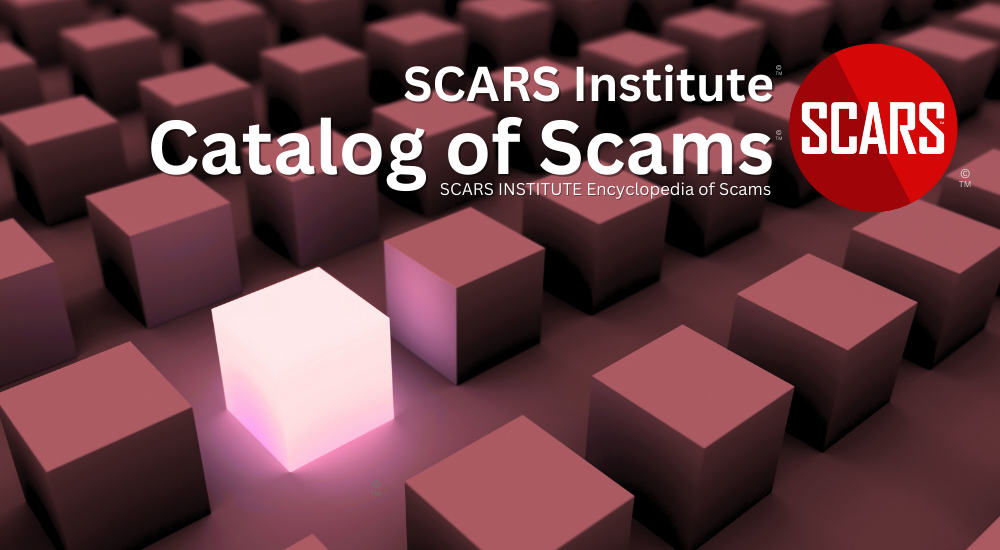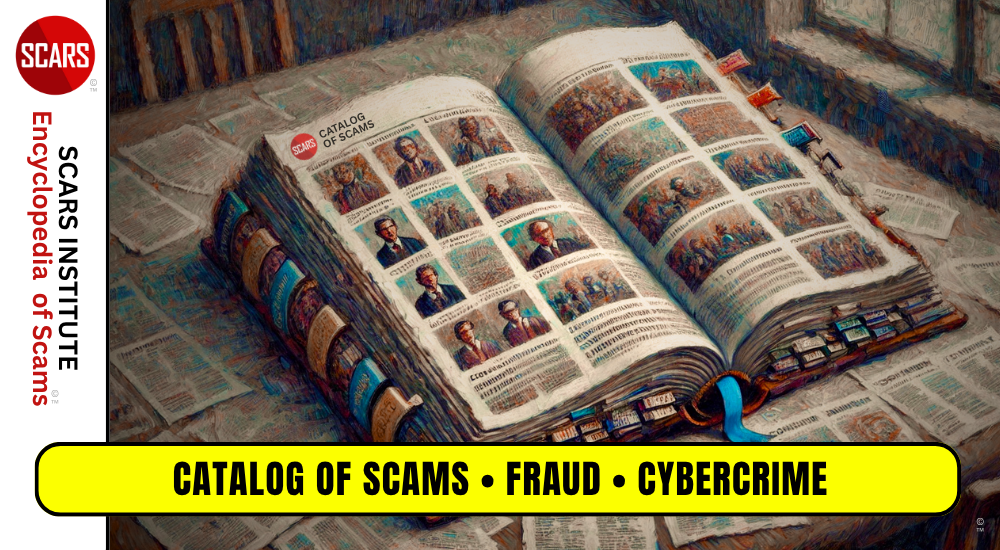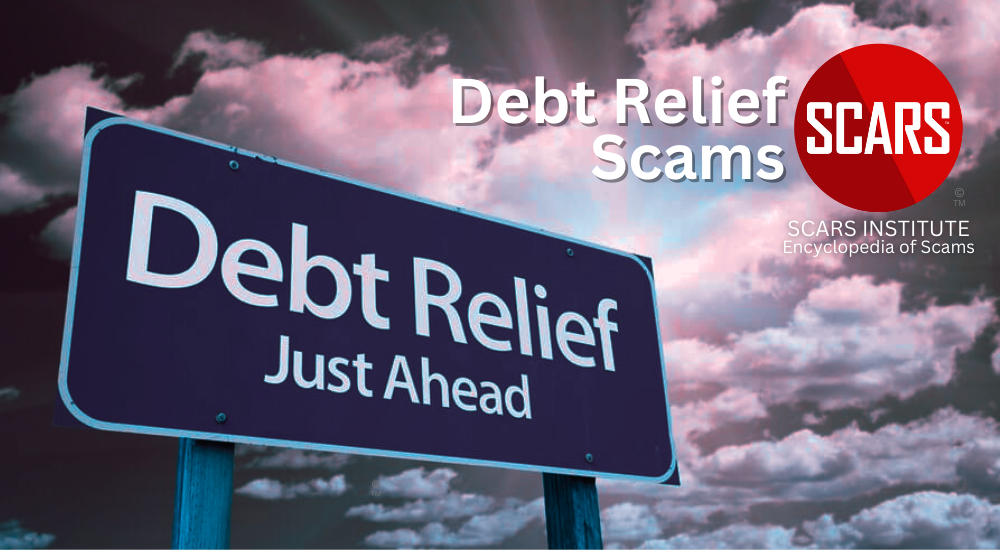
SCARS Institute’s Encyclopedia of Scams™ Published Continuously for 25 Years

Debt Relief Scams
A Real Danger for Scam Victims Looking for Financial Relief!
How Scams Work – A SCARS Institute Insight
Author:
• SCARS Institute Encyclopedia of Scams Editorial Team – Society of Citizens Against Relationship Scams Inc.
Article Abstract
Debt relief scams target individuals facing financial difficulties by offering fraudulent solutions to reduce or eliminate debt. These scams often demand upfront fees, guarantee unrealistic results, or claim affiliation with government programs, but instead leave victims in worse financial situations.
Warning signs include unsolicited offers, pressure to stop paying creditors, and promises of quick fixes. To avoid falling victim, individuals should thoroughly research any company, consult professionals, and never pay for services upfront. Staying informed and cautious can prevent further financial harm.

Debt Relief Scams – a Continuing Danger for Scam Victims and the General Public
REPORT ALL DEBT RELIEF SCAMS TO THE U.S. FEDERAL TRADE COMMISSION
Debt relief scams are fraudulent schemes where scammers promise to help individuals reduce or eliminate their debt, often using deceptive and illegal methods. These scams target people in financial distress by offering quick and seemingly easy solutions to get out of debt. However, instead of providing legitimate assistance, these schemes often result in victims losing money, damaging their credit, or even falling further into debt.
How Debt Relief Scams Work
Debt relief scams typically begin with unsolicited offers through phone calls, texts, emails, or letters. The scammers may present themselves as legitimate debt relief companies, often claiming they can negotiate with creditors, settle debts for a fraction of what’s owed, or consolidate multiple debts into a single, more manageable payment. They may even claim to represent government programs designed to help consumers struggling with debt.
Once the scammers have a victim’s attention, they usually demand an upfront fee for their services. In some cases, they ask for continuous payments under the pretense of negotiating with creditors. Victims are often told to stop making payments to their creditors, which can lead to penalties, increased interest rates, and further damage to their credit scores. In the worst cases, these scams result in victims losing thousands of dollars while receiving no real help in managing their debt.
How to Recognize Debt Relief Scams
Debt relief scams can be tricky to spot because they often present themselves as legitimate businesses. However, there are several warning signs to look out for:
Upfront Fees: One of the biggest red flags is a company that demands large upfront payments before providing any services. Under U.S. Federal Trade Commission (FTC) regulations, it is illegal for debt relief companies to charge fees before they have successfully resolved a person’s debt.
Guaranteed Results: No legitimate debt relief company can guarantee that they will reduce or eliminate your debt. Scammers often make bold promises about settling debt for pennies on the dollar or wiping out credit card balances entirely. In reality, these outcomes are unlikely.
Unsolicited Offers: Be cautious of any unsolicited calls, emails, or messages offering debt relief services. Legitimate debt relief companies do not typically reach out to individuals in this manner.
Pressure to Stop Communicating with Creditors: Scammers may tell you to stop making payments to your creditors and to cease all communication with them. This advice is dangerous, as it can lead to default, legal action from creditors, and further financial harm.
Claims of Government Programs: Scammers often claim they are connected to government debt relief programs. While the government offers assistance with certain types of debt, such as student loans, there are no programs to eliminate personal debt like credit card debt or personal loans. Any claims of special government programs for personal debt relief should be viewed with skepticism.
Use of Illegal Strategies: Some scammers may suggest illegal tactics, such as creating a new credit identity using a Credit Privacy Number (CPN) or encouraging you to misrepresent your financial situation to creditors. These tactics can lead to legal consequences and further financial trouble.
How to Avoid Debt Relief Scams
There are several steps you can take to protect yourself from falling victim to debt relief scams:
Research the Company: Before engaging with any debt relief company, thoroughly research them. Look for reviews, complaints, and whether they are registered with the Better Business Bureau (BBB). Avoid companies with negative reviews or those that have not been in business for long.
Check for Licensing and Accreditation: Legitimate debt relief companies should be licensed in your state and accredited by reputable organizations. Be wary of companies that do not provide clear information about their credentials.
Consult a Professional: If you’re unsure whether a debt relief offer is legitimate, consider consulting a financial advisor or a credit counselor from a reputable nonprofit organization. These professionals can help you assess your financial situation and recommend legitimate options for managing debt.
Never Pay Upfront: Remember, it’s illegal for debt relief companies to charge you before they’ve done anything to help. If a company asks for payment upfront, walk away.
Verify Claims of Government Programs: If a company claims to be affiliated with a government program, verify it by contacting the appropriate government agency directly. Don’t take the company’s word for it.
Summary
Debt relief scams prey on individuals who are already struggling with financial difficulties, offering them false hope and causing further harm. By learning to recognize the warning signs—such as demands for upfront fees, guaranteed results, and unsolicited offers—consumers can protect themselves from these fraudulent schemes. Always do thorough research, consult professionals, and avoid any company that makes unrealistic promises. Being informed and cautious is the best way to avoid falling victim to a debt relief scam.
-/ 30 /-
What do you think about this?
Please share your thoughts in a comment below!
LEAVE A COMMENT?
Recent Comments
On Other Articles
- Arwyn Lautenschlager on Love Bombing And How Romance Scam Victims Are Forced To Feel: “I was love bombed to the point that I would do just about anything for the scammer(s). I was told…” Feb 11, 14:24
- on Dani Daniels (Kira Lee Orsag): Another Scammer’s Favorite: “You provide a valuable service! I wish more people knew about it!” Feb 10, 15:05
- on Danielle Delaunay/Danielle Genevieve – Stolen Identity/Stolen Photos – Impersonation Victim UPDATED 2024: “We highly recommend that you simply turn away form the scam and scammers, and focus on the development of a…” Feb 4, 19:47
- on The Art Of Deception: The Fundamental Principals Of Successful Deceptions – 2024: “I experienced many of the deceptive tactics that romance scammers use. I was told various stories of hardship and why…” Feb 4, 15:27
- on Danielle Delaunay/Danielle Genevieve – Stolen Identity/Stolen Photos – Impersonation Victim UPDATED 2024: “Yes, I’m in that exact situation also. “Danielle” has seriously scammed me for 3 years now. “She” (he) doesn’t know…” Feb 4, 14:58
- on An Essay on Justice and Money Recovery – 2026: “you are so right I accidentally clicked on online justice I signed an agreement for 12k upfront but cd only…” Feb 3, 08:16
- on The SCARS Institute Top 50 Celebrity Impersonation Scams – 2025: “Quora has had visits from scammers pretending to be Keanu Reeves and Paul McCartney in 2025 and 2026.” Jan 27, 17:45
- on Scam Victims Should Limit Their Exposure To Scam News & Scammer Photos: “I used to look at scammers photos all the time; however, I don’t feel the need to do it anymore.…” Jan 26, 23:19
- on After A Scam, No One Can Tell You How You Will React: “This article was very informative, my scams happened 5 years ago; however, l do remember several of those emotions and/or…” Jan 23, 17:17
- on Situational Awareness and How Trauma Makes Scam Victims Less Safe – 2024: “I need to be more observant and I am practicing situational awareness. I’m saving this article to remind me of…” Jan 21, 22:55
ARTICLE META
Important Information for New Scam Victims
- Please visit www.ScamVictimsSupport.org – a SCARS Website for New Scam Victims & Sextortion Victims
- Enroll in FREE SCARS Scam Survivor’s School now at www.SCARSeducation.org
- Please visit www.ScamPsychology.org – to more fully understand the psychological concepts involved in scams and scam victim recovery
If you are looking for local trauma counselors please visit counseling.AgainstScams.org or join SCARS for our counseling/therapy benefit: membership.AgainstScams.org
If you need to speak with someone now, you can dial 988 or find phone numbers for crisis hotlines all around the world here: www.opencounseling.com/suicide-hotlines
A Note About Labeling!
We often use the term ‘scam victim’ in our articles, but this is a convenience to help those searching for information in search engines like Google. It is just a convenience and has no deeper meaning. If you have come through such an experience, YOU are a Survivor! It was not your fault. You are not alone! Axios!
A Question of Trust
At the SCARS Institute, we invite you to do your own research on the topics we speak about and publish, Our team investigates the subject being discussed, especially when it comes to understanding the scam victims-survivors experience. You can do Google searches but in many cases, you will have to wade through scientific papers and studies. However, remember that biases and perspectives matter and influence the outcome. Regardless, we encourage you to explore these topics as thoroughly as you can for your own awareness.
Statement About Victim Blaming
SCARS Institute articles examine different aspects of the scam victim experience, as well as those who may have been secondary victims. This work focuses on understanding victimization through the science of victimology, including common psychological and behavioral responses. The purpose is to help victims and survivors understand why these crimes occurred, reduce shame and self-blame, strengthen recovery programs and victim opportunities, and lower the risk of future victimization.
At times, these discussions may sound uncomfortable, overwhelming, or may be mistaken for blame. They are not. Scam victims are never blamed. Our goal is to explain the mechanisms of deception and the human responses that scammers exploit, and the processes that occur after the scam ends, so victims can better understand what happened to them and why it felt convincing at the time, and what the path looks like going forward.
Articles that address the psychology, neurology, physiology, and other characteristics of scams and the victim experience recognize that all people share cognitive and emotional traits that can be manipulated under the right conditions. These characteristics are not flaws. They are normal human functions that criminals deliberately exploit. Victims typically have little awareness of these mechanisms while a scam is unfolding and a very limited ability to control them. Awareness often comes only after the harm has occurred.
By explaining these processes, these articles help victims make sense of their experiences, understand common post-scam reactions, and identify ways to protect themselves moving forward. This knowledge supports recovery by replacing confusion and self-blame with clarity, context, and self-compassion.
Additional educational material on these topics is available at ScamPsychology.org – ScamsNOW.com and other SCARS Institute websites.
Psychology Disclaimer:
All articles about psychology and the human brain on this website are for information & education only
The information provided in this article is intended for educational and self-help purposes only and should not be construed as a substitute for professional therapy or counseling.
While any self-help techniques outlined herein may be beneficial for scam victims seeking to recover from their experience and move towards recovery, it is important to consult with a qualified mental health professional before initiating any course of action. Each individual’s experience and needs are unique, and what works for one person may not be suitable for another.
Additionally, any approach may not be appropriate for individuals with certain pre-existing mental health conditions or trauma histories. It is advisable to seek guidance from a licensed therapist or counselor who can provide personalized support, guidance, and treatment tailored to your specific needs.
If you are experiencing significant distress or emotional difficulties related to a scam or other traumatic event, please consult your doctor or mental health provider for appropriate care and support.
Also read our SCARS Institute Statement about Professional Care for Scam Victims – click here to go to our ScamsNOW.com website.
















Thank you for your comment. You may receive an email to follow up. We never share your data with marketers.